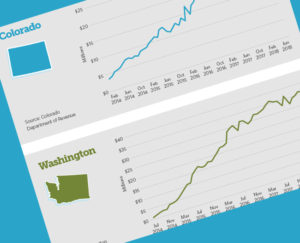Colorado Leads Submits Public Comment in Support of Federal Rescheduling
Colorado Leads submitted a public comment in support of the Department of Justice’s proposed rule to transfer marijuana from schedule I to schedule III of the Controlled Substances Act.
As the leading marijuana business association in the nation’s longest- running state-regulated marijuana market, we are uniquely positioned to help inform DOJ’s analysis. We also felt it was imperative that we participate in the rescheduling process since it will directly and substantially impact our businesses, our industry as a whole, and our state and local communities.
Our comment begins by explaining how Colorado’s experience and public policies support HHS’s conclusions that:
- marijuana has a currently accepted medical use in treatment; and
- marijuana has less potential for abuse than substances in schedules I and II, as well as alcohol, which is an unscheduled substance.
DOJ specifically solicited comments on the economic impact of the proposed rule, recognizing it may significantly affect a substantial number of small entities, including state-regulated marijuana businesses that would no longer be subject to section 280E of the Internal Revenue Code. It could also impact entities that engage in marijuana research, which may be subject to different protocols set by the DEA.
Colorado Leads surveyed its membership regarding the impact they expect it could have on their businesses, and we offered some of the insights that were shared, along with our analysis of the impact rescheduling could have on our industry, state, and local communities. We also reached out to leaders of Colorado’s marijuana research community to get their thoughts.






 Projections show cannabis employment growth could increase 50% in 2020. That would be more than the number of the nation’s computer programmers.
Projections show cannabis employment growth could increase 50% in 2020. That would be more than the number of the nation’s computer programmers.  The year marijuana was hailed as a miraculous treatment for “general debility” and “nervous excitement.” Since then, there hasn’t been much scientific research on cannabis, but Colorado is one of the states trying to
The year marijuana was hailed as a miraculous treatment for “general debility” and “nervous excitement.” Since then, there hasn’t been much scientific research on cannabis, but Colorado is one of the states trying to  Put a $ in front of it and it’s $167 million. That’s the tax revenue generated by the Colorado cannabis industry from January through June of 2020. Since legalization, the state has received nearly $1.4 billion in cannabis taxes and fees.
Put a $ in front of it and it’s $167 million. That’s the tax revenue generated by the Colorado cannabis industry from January through June of 2020. Since legalization, the state has received nearly $1.4 billion in cannabis taxes and fees. Here are the 35
Here are the 35  That is how much of an increase in the rates of crime in states bordering Colorado and Washington, according to
That is how much of an increase in the rates of crime in states bordering Colorado and Washington, according to 

 Bob DeGabrielle, CEO of Los Sueños Farms, talked to Westword about the problems cannabis growers face when hit with severe and unpredictable weather. Growers aren’t allowed under Colorado law to move plants off the property during a weather emergency.
Bob DeGabrielle, CEO of Los Sueños Farms, talked to Westword about the problems cannabis growers face when hit with severe and unpredictable weather. Growers aren’t allowed under Colorado law to move plants off the property during a weather emergency.  Amen
Amen More taxes?
More taxes? Another first for Colorado
Another first for Colorado Move to overturn the will of the voters
Move to overturn the will of the voters



 Getting what you need
Getting what you need Thinking outside the box
Thinking outside the box We got this
We got this Cannabis love connection
Cannabis love connection NIMBYers take note
NIMBYers take note

 The Pew Charitable Trusts looks at the inherent difficulties in projecting tax revenues in states with legal cannabis. The report includes some interesting graphics comparing Colorado to other states.
The Pew Charitable Trusts looks at the inherent difficulties in projecting tax revenues in states with legal cannabis. The report includes some interesting graphics comparing Colorado to other states.  The Louisville City Council approved two ordinances to send two November ballot questions to voters: one, to allow marijuana cultivation facilities in the city and two, authorization to impose an excise tax on those facilities.
The Louisville City Council approved two ordinances to send two November ballot questions to voters: one, to allow marijuana cultivation facilities in the city and two, authorization to impose an excise tax on those facilities. Denver-area schools will split more than $14 million raised through marijuana taxes and lottery revenue for projects ranging from replacing roofs to expanding their buildings.
Denver-area schools will split more than $14 million raised through marijuana taxes and lottery revenue for projects ranging from replacing roofs to expanding their buildings.
 Colorado budget writers want to prioritize spending marijuana tax money on opioids and education, but it could mean cuts elsewhere.
Colorado budget writers want to prioritize spending marijuana tax money on opioids and education, but it could mean cuts elsewhere.